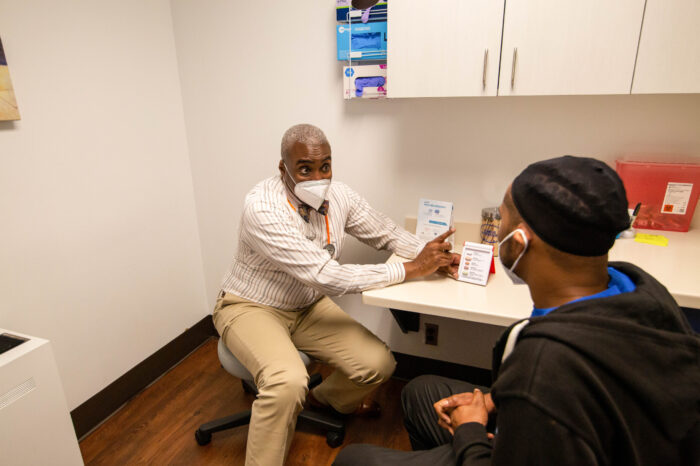PrEP & PEP TREATMENT FOR HIV
Highly effective treatment options for preventing HIV transmission.

Though there is currently no preventative vaccine that reduces the risk of contracting HIV/AIDS, there are now tools available to help you reduce your risk of acquiring this virus. If you are someone who is at a high risk of contracting HIV/AIDS, your doctor may recommend Pre-Exposure Prophylaxis (PrEP) or Post Exposure Prophylaxis (PEP) depending on whether or not you have already been exposed to HIV. At Washington Health Institute, we offer both PrEP and PEP prevention treatment methods and will work with you to determine which system is right for you. PrEP is recommended for those who are HIV-negative and have not yet been exposed to HIV, while PEP is a preventative treatment that should be taken immediately after an HIV-negative person is exposed to HIV. While these methods are not a guaranteed way to prevent HIV transmission, these are essential tools that can significantly reduce your risk of contracting the disease.
What is Pre-Exposure Prophylaxis?
PrEP is short for Pre-Exposure Prophylaxis, which is the use of antiretroviral medication to prevent the acquisition of an HIV infection. Any licensed prescriber can prescribe PrEP, including our Primary Care providers and Infectious Disease specialists.
This prevention method is best used by people who do not currently have HIV but are at high risk of exposure through sexual contact or injection drug use. This medication, when taken correctly along with other risk reduction methods, can significantly reduce your risk of contracting HIV from sexual partners or contaminated injection materials.
How PrEP Works
PrEP works by taking a single pill sold under the name Truvada. Truvada is made up of a combination of two HIV medications, tenofovir and emtricitabine. This pill is taken every single day to provide a high level of protection against HIV transmission. Studies have shown that the risk of getting HIV infection is up to 92% lower for those who take PrEP every day compared to those who do not take the pill. However, it’s important to remember to take the pill every single day for the best results. When not taken consistently, PrEP can be much less effective.
What to Expect When Starting PrEP
If you are interested in seeking out Pre-Exposure Prophylaxis treatment, there are a few things you’ll want to do. The first step is to speak with your primary care provider and express that you’d like to hear more about whether PrEP is right for your individual needs. If you and your healthcare provider determine that PrEP might be a good option for you, here’s what you can expect prior to and during treatment:
HIV Testing: PrEP is only effective for patients who are currently HIV-negative and have not been exposed to HIV. If your test result comes back positive, you’ll need to pursue other avenues for treatment.
Renal Sufficiency Testing: PrEP is only prescribed to those who have healthy kidneys. Your provider will need to test you for renal insufficiency prior to prescribing PrEP.
Treatment Adherence: You will need to consistently take your PrEP pill every day for the best results. If you are having trouble remembering to take your pill regularly, speak with your healthcare provider for assistance.
Paying For PrEP: Most insurance providers cover PrEP. If yours does not, or if you do not have insurance, speak with your healthcare provider for resources that may help cover the cost of your medication. Even after starting PrEP, you’ll need to come in for regular follow-ups to test for HIV and medication adherence support, as well as to assess other behavioral risk reduction strategies.
What is Post Exposure Prophylaxis?
PEP stands for Post Exposure Prophylaxis, which is the use of groundbreaking antiretroviral prescription medications to prevent HIV infection in HIV-negative individuals who have recently had a specific high-risk exposure to HIV. When taken as directed within the first 72 hours after exposure, PEP can be a useful tool in the prevention of HIV transmission.
How PEP Works
PEP is a 28-day course of three antiretroviral medications taken every day. When taken as directed, these medications work together to reduce the risk of contracting HIV after a specific event wherein the patient was exposed to HIV, often through either sexual contact or the shared use of contaminated injection drug materials. Your specific PEP regimen will be determined by your healthcare provider, but the preferred regimen often prescribed to adults and adolescents includes two medications taken once daily and a third medication taken either once or twice per day. Your doctor will direct you to the proper prescriptions for your individual case.
What to Expect with PEP
Direct exposure to HIV is classified as a medical emergency because the virus establishes itself in the body very quickly, often within only 24 to 36 hours after exposure. If you believe you’ve been exposed to HIV, either through sexual contact or injection drug use, call your doctor immediately. PEP has the best results when administered as soon as possible and within a 72-hour window after exposure. Once you’ve contacted your doctor, here are some general guidelines on what to expect.
HIV Rapid Testing: The first thing your doctor will need to do is determine if you are HIV-negative. PEP will only work on those who have been exposed to HIV but are still reporting as negative for HIV.
Expedited First Dose: The first dose of PEP will often be expedited prior to further testing. If even a rapid HIV baseline test is not readily accessible, your doctor may give you your first dose of PEP before you are tested for HIV to further expedite the process and give the medicine the best chance of being effective.
Further Testing: Your doctor will also likely test you for a variety of other conditions, such as STI screenings, Hepatitis B and C testing, pregnancy tests and so on as necessary.
Prescription Adherence: Once you have been prescribed PEP, it is essential that you strictly follow your doctor’s instructions on when to take your medication for the full 28 days. Failure to adhere to the prescribed treatment plan may significantly reduce the effectiveness of PEP.
Paying For PEP: Many insurances will cover PEP, including Medicaid. If your insurance does not cover PEP, or if you do not have insurance, your doctor will direct you to resources and assistance programs that may be able to help cover your medication cost.
